|
|
|
Sort Order |
|
|
|
Items / Page
|
|
|
|
|
|
|
| Srl | Item |
| 1 |
ID:
099794
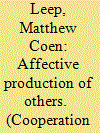

|
|
|
|
|
| Publication |
2010.
|
| Summary/Abstract |
IR scholars have recently turned to emotions to understand and explain events in world politics. Although this turn is appealing, most scholars have failed to critically examine the relationships between emotion, language, identity and foreign policy. This article aims to unpack these relationships. Drawing upon Sara Ahmed's notion of the 'emotionality of texts', this article explores how foreign policy may be an affective practice, which can be defined as a ritualized practice of discursively binding emotions to Others' identities and legitimating foreign policy through a discursive logic of feeling. In this way, identities are produced and policies are legitimated affectively. Neglecting the emotional narratives that constitute Self/Other relations leads to an insufficient understanding of emotion in global politics, an incomplete understanding of how identities emerge and matter as they do, and forecloses new alternatives of apprehending transformative ruptures and enduring patterns of Self/Other interaction. Through an analysis of United States policy towards the Israeli-Palestinian conflict, this article highlights the importance of emotion and affective practices in world politics.
|
|
|
|
|
|
|
|
|
|
|
|
|
|
|
|
| 2 |
ID:
151087
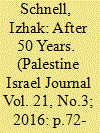

|
|
|
|
|
| Summary/Abstract |
The Israeli-Palestinian conflict is a dispute between two national movements claiming the same territory. It has been ongoing for over a hundred years, passing through different phases. In this respect, the 1967 Six-Day War signified the beginning of a new stage in the conflict in which relations between the occupied and the occupier have come to play a formative role in Israeli reality and be a primary factor in the construction of Israeli society. Since 1967 Israel has occupied Palestinian territories, and the Palestinian population has been living under occupation for almost five decades. In the summer of 2005, Israel withdrew unilaterally from the Gaza Strip and from four settlements on the West Bank, nevertheless continuing to control many aspects of life in Gaza (via border controls, blockades and other restrictions).
|
|
|
|
|
|
|
|
|
|
|
|
|
|
|
|
| 3 |
ID:
085722
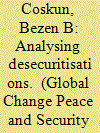

|
|
|
|
|
| Publication |
2008.
|
| Summary/Abstract |
Securitisation theory, which has been developed by a number of scholars affiliated to the Copenhagen Peace Research Institute, has become one of the most attractive analytical tools in contemporary critical security studies. The work of Barry Buzan, Ole waever and others has made a major contribution to our understanding of the dynamics of security by introducing the concepts of 'securitisation' and 'desecuritisation'. However, while this approach has made a major theoretical contribution in general, there have been few attempts at applying the concept of desecuritisation in particular. Moreover, at the theoretical level, there are also problems, notably an under-theorisation of the desecuritisation. This article is an attempt to apply the under-employed/under-theorised concept of desecuritisation to the Israeli-Palestinian case with a particular focus on the potential for desecuritisation arising from Israeli-Palestinian cooperation/coexistence efforts. Based on a conceptual framework that integrates desecuritisation with the concepts of peace-building and peace-making, the article pays attention to peace education efforts involving Israeli and Palestinian civil societies as desecuritisation initiatives.
|
|
|
|
|
|
|
|
|
|
|
|
|
|
|
|
| 4 |
ID:
126726
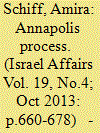

|
|
|
|
|
| Publication |
2013.
|
| Summary/Abstract |
The analysis indicates three sets of factors through which parties' willingness to achieve a consensual solution can be assessed: the contextual factors that contribute to adversaries' decision to proceed to official negotiations, the functions of the pre-negotiations and the changes that occur in the parties' perceptions during the pre-negotiations. A simultaneous exploration of these factors provides a more complete assessment of the parties' intentions and their willingness to proceed to negotiations directed at a win-win solution. This, in turn, enables a better understanding of the factors that undermine de-escalation initiatives, not only between Israel and the Palestinians but in other intractable conflicts as well.
|
|
|
|
|
|
|
|
|
|
|
|
|
|
|
|
| 5 |
ID:
110206
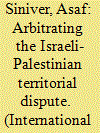

|
|
|
|
|
| Publication |
2012.
|
| Summary/Abstract |
This article presents the case for arbitrating the territorial dispute over the West Bank between Israel and the Palestinian Authority. After nearly two decades of intense intermediary activity but with still no signs of progress, and against the inability of the parties themselves to move towards reconciliation, the article argues that as a method of conflict resolution, mediation has exhausted its primary objective - namely the establishing of direct channels of communication between the disputants - and it is now time to examine alternative methods to conflict resolution. The article debunks the myths surrounding the success of American mediation in the conflict, and uses the historical case of the Taba arbitration between Israel and Egypt to demonstrate under what terms the arbitration of the West Bank dispute might be presented, while taking into consideration its advantages and drawbacks compared with the more established method of mediation in this conflict.
|
|
|
|
|
|
|
|
|
|
|
|
|
|
|
|
| 6 |
ID:
102513


|
|
|
|
|
| Publication |
2011.
|
| Summary/Abstract |
In the past few decades, planned contact interventions between groups in conflict have played an important role in attempts at improving intergroup relations and achieving peace and reconciliation. This article focuses on such reconciliation-aimed intergroup encounters between Israeli Jews and Palestinians that seek to reduce hostility and increase understanding and cooperation between the two nationalities. Like other contact interventions conducted in settings of intergroup conflict, encounters between Israeli Jews and Palestinians represent a paradoxical project: this is a project that aspires to generate equality and cooperation between groups that are embedded in a protracted asymmetrical conflict. Though existing research teaches us valuable lessons on the effectiveness of contact conducted under optimal conditions, little is said about contact between groups involved in asymmetrical protracted dispute. The goal of this analysis is to examine the evolution of reconciliation-aimed contact interventions between Israeli Jews and Palestinians in the past 20 years. The research method is qualitative, relying on ethnographic data assembled during the relevant period of time. The findings identify and trace the evolution of four major models of Jewish-Palestinian planned encounters: the Coexistence Model, the Joint Projects Model, the Confrontational Model, and the Narrative-Story-Telling Model. The strengths and limitations of each model in transforming intergroup attitudes in asymmetric conflict are discussed.
|
|
|
|
|
|
|
|
|
|
|
|
|
|
|
|
| 7 |
ID:
177576
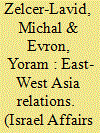

|
|
|
|
|
| Summary/Abstract |
As East-West Asia relations expand and diversify, cross-regional non-state relations develop as well. Surprisingly though, this development has so far been largely overlooked. Attempting to fill this void, this article focuses on the involvement of Japan’s and South Korea’s civil societies in the Israeli-Palestinian conflict. More specifically, it argues that the intensification of cross-regional connections between East Asia and the Middle East generates involvement of the civil society in this conflict, whose specific shape is influenced by the attributes of each state. To test this supposition, the article comparatively examines the civilian protests in Japan and South Korea against Israel and their impact. The article’s contribution is fourfold: it examines the important yet inadequately studied growing civil society participation in East-West Asia relations; it indicates the relatively new interaction between state and non-state actors in East Asia concerning the Middle East; it explores for the first time protest movements against Israel in East Asia; and it enriches existing knowledge about civil society participation in South Korea’s and Japan’s foreign relations with an intriguing yet so far overlooked case.
|
|
|
|
|
|
|
|
|
|
|
|
|
|
|
|
| 8 |
ID:
121844


|
|
|
|
|
| Publication |
2013.
|
| Summary/Abstract |
This study presents a systematic transcript-based analysis of the dialogue occurring in a track two workshop attended by Jewish-Israelis and Palestinians. We hypothesized that participants from conflicting groups would form a shared superordinate identity in the course of the workshop. Our findings confirmed this hypothesis. Consistent with self-categorization theory, we demonstrate that the observed Jewish-Israelis and Palestinians mutually identified with the peacecamp, a collection of people and organizations that promote dialogue and conflict resolution efforts. In line with our expectations, and in contradiction to previous findings concerning communication between groups in conflict, participants demonstrated patterns of cooperative, counter-ethnocentric interaction. Through the paradigm of social identity theory, we explain these phenomena as the result of the participants' salient superordinate peacecamp identity. The study's findings offer an innovative theoretical contribution to the common ingroup identity model, showing that the reduction of intergroup bias can actually hinder the effectiveness of conflict resolution efforts. Specifically, by forming a superordinate identity, the observed participants are left less able to represents the needs, demands, and claims of their respective national groups and, hence, less able to produce ideas acceptable to their respective publics. The study also offers a practical contribution to the field of track two diplomacy, empirically verifying Hebert Kelman's assertion that when facilitators allow participants to form a cohesive group, they risk damaging both the quality of the workshop's ideas and the participants' ability to influence their leaderships (Rouhana and Kelman 1994; Kelman 1999, 2002).
|
|
|
|
|
|
|
|
|
|
|
|
|
|
|
|
| 9 |
ID:
138316


|
|
|
|
|
| Summary/Abstract |
While my last four years in Jerusalem have been deeply enriching and engrossing, coming up close and dealing first-hand with the ubiquitous Israeli-Palestinian conflict, they haven’t exactly been the happiest of times for those like me who are interested in a just and peaceful settlement of the conflict for Palestinians and Israelis alike. With the notable exception of the major diplomatic effort led by U.S. Secretary of State John Kerry, the situation on the ground and the political outlook has been bleak. At times it has been downright gut-wrenching. Last summer, over 2,200 people were killed in the Gaza Strip, many of whom were innocent children and civilians. This was the third military confrontation between Israel and the Palestinians in six years, only more violent and more destructive. The destruction I saw driving through Shuja’iyya — one of the largest residential neighborhoods in the Gaza Strip — is testimony to that. Once again, this latest round could have easily been avoided. Today, Gaza remains cut off and isolated, with an uncertain political outlook. A return to violence looks disconcertingly unavoidable.
|
|
|
|
|
|
|
|
|
|
|
|
|
|
|
|
| 10 |
ID:
089222


|
|
|
|
|
| Publication |
2009.
|
| Summary/Abstract |
It took just one month for U.S. President Barack Obama's foreign policy team to establish its line on China: more cooperation on more issues more often. As Secretary of State Hillary Clinton enthusiastically declared during her brief visit to Beijing in late February, "The opportunities for us to work together are unmatched anywhere in the world."
|
|
|
|
|
|
|
|
|
|
|
|
|
|
|
|
| 11 |
ID:
171674
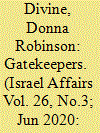

|
|
|
|
|
| Summary/Abstract |
The Gatekeepers” describes the reaction of a handful of well established Israel Studies scholars to a special issue of the journal Israel Studies called “Word Crimes: Reclaining the Language of the Israeli-Palestinian Conflict”. These professors preferred to denounce rather than engage with the arguments and analyses presented in the special issue deploying their authority to try to silence this challenge to the conventional discourse on the Middle East Conflict.
|
|
|
|
|
|
|
|
|
|
|
|
|
|
|
|
| 12 |
ID:
178301
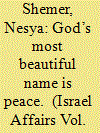

|
|
|
|
|
| Summary/Abstract |
Rabbi Menachem Froman was a foremost religious peace activist who sought to promote Israeli-Palestinian reconciliation through conversations with religious leaders of the two peoples and discussions with politicians in Israel and the world. This article examines his vision of inter-religious peace and his attempts to realise this vision, using archival materials revealed after his death in 2013 as well as his previously published philosophical musings and writings.
|
|
|
|
|
|
|
|
|
|
|
|
|
|
|
|
| 13 |
ID:
126724
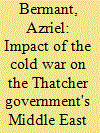

|
|
|
|
|
| Publication |
2013.
|
| Summary/Abstract |
This article argues that Margaret Thatcher's concern over Soviet ambitions was a highly significant factor behind the general agreement between 10 Downing Street and the Foreign Office (FCO) on the Middle East during the 1980s. Notwithstanding her instinctive understanding for the State of Israel, Thatcher increasingly perceived Israeli policies as a liability rather than an asset for Western interests, in view of worries that they were increasing instability in the region, and therefore undermining the security of Britain's Arab allies. Thatcher feared that the Soviets and other radical forces would exploit regional turmoil in order to expand their influence in the Middle East. Therefore, she agreed with the FCO on the urgent need to resolve the Israeli-Palestinian conflict as a means of defusing regional tensions at a time of heightened cold war friction.
|
|
|
|
|
|
|
|
|
|
|
|
|
|
|
|
| 14 |
ID:
109182
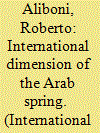

|
|
|
|
|
| Publication |
2011.
|
| Summary/Abstract |
The Arab spring is a transition away from the long alliance between the West and the moderate Arab states, as well as a transition on the part of these states from being more or less passive clients of the US and the West to more or less vibrant democracies with an assertive agenda in the region. As elections take place, they will generate more democratically and Islamist-based governments, certainly more sensitive than previous ones to nationalist feelings and with foreign policy objectives more or less diverging from Western ones. This compels Western countries to revisit and possibly adjust foreign strategies and policies. In this perspective, American and European policy towards the Israeli--Palestinian conflict in recent years may remain a stumbling block in the West's relations with the Middle East and may make the ongoing process of political change in the region more difficult and uncertain.
|
|
|
|
|
|
|
|
|
|
|
|
|
|
|
|
| 15 |
ID:
106307
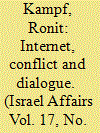

|
|
|
|
|
| Publication |
2011.
|
| Summary/Abstract |
This article reviews studies evaluating Internet-based planned encounters between Israeli Jews and Palestinians and between Jews and Arabs in Israel. It goes on to explain the contradictory outcomes of these encounters concerning the potential of the Internet to serve as a learning ground for social and political understanding. Various aspects of these encounters, and the unique features of the medium in which they were conducted, are examined. These factors provide a framework for studying the potential of the Internet to promote positive inter-group contact.
|
|
|
|
|
|
|
|
|
|
|
|
|
|
|
|
| 16 |
ID:
119465
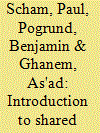

|
|
|
|
|
| Publication |
2013.
|
| Summary/Abstract |
S ince the publication of S hared H istories 1 in 2005, the narratives of the various sides in the Israeli-Palestinian conflict have become both a cottage industry 2 and a common catchphrase 3 used frequently even by negotiators and politicians. However, the concept of narratives as a working tool in the peace process has not yet been taken on board by those involved in resolving the conflict.
|
|
|
|
|
|
|
|
|
|
|
|
|
|
|
|
| 17 |
ID:
121235


|
|
|
|
|
| Publication |
2012.
|
| Summary/Abstract |
Is Canada's foreign policy aligned with that of the United States? This
question frequently comes up in foreign policy circles and was recently
raised during the popular uprisings in North Africa and the Middle East.
Some observers have maintained that Ottawa's policy with regard to the
"Arab Spring" followed that of Washington.1
This criticism is in keeping with
the perception that, since coming to power in February 2006, the Harper
government has strategically aligned Canada's policies more closely with
those of the United States.2
Some positions of the Harper government, in particular with respect to the Kyoto Protocol, the Israeli-Palestinian conflict,
and the North American security perimeter, have reinforced this idea.3
|
|
|
|
|
|
|
|
|
|
|
|
|
|
|
|
| 18 |
ID:
138326
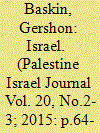

|
|
|
|
|
| Summary/Abstract |
Israel views itself as the nation-state of the Jewish people, and Prime Minister Binyamin Netanyahu demands that the Palestinians recognize Israel as such as a prerequisite to what he claims would be genuine negotiations on a two-state solution. The proposals to partition Palestine/Eretz Yisrael into two states for two peoples date as far back as 1937 to the Peel Commission, and were based on the assertion that the Israeli-Palestinian conflict is an identity-territorial conflict between two national movements over the territorial expression of their separate identities.
|
|
|
|
|
|
|
|
|
|
|
|
|
|
|
|
| 19 |
ID:
111724
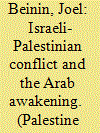

|
|
|
|
|
| Publication |
2012.
|
| Summary/Abstract |
The March 15 Youth Movement, whose name comes from demonstrations held in the West Bank and Gaza Strip that day to demand unity between Fateh and Hamas, is the most direct Palestinian expression of the "Arab Awakening" of 2010-11. The next day, March 16, Fateh's leader, Palestinian Authority (PA) President Mahmoud Abbas, announced his willingness to travel to Gaza to conduct unity talks with Hamas. A reconciliation agreement was signed in Cairo on May 4.
Implementation of the Hamas-Fateh accord stalled earlier this year because Abbas insisted on retaining Salam Fayyad as prime minister of the PA. Hamas regards Fayyad as too subservient to Israel and the West. It particularly resents his cooperation with the United States in creating the new National Security Forces, popularly known as the "Dayton Brigades" after their first trainer, Lt. Gen. Keith Dayton of the US Army. A major task of these units has been to suppress Hamas in the West Bank, and it has done so to Israel's satisfaction.
|
|
|
|
|
|
|
|
|
|
|
|
|
|
|
|
| 20 |
ID:
107593
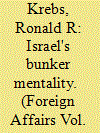

|
|
|
|
|
| Publication |
2011.
|
| Summary/Abstract |
The greatest danger to Israel comes not from without -- in the form of Palestinian intransigence -- but from within. The ongoing occupation of the territories is destroying Israel's values and viability. It breeds an aggressive, intolerant ethnic nationalism and causes political gridlock, empowering an ultrareligious underclass that refuses to contribute and lives off the state.
|
|
|
|
|
|
|
|
|
|
|
|
|
|
|
|
|
|
|
|
|